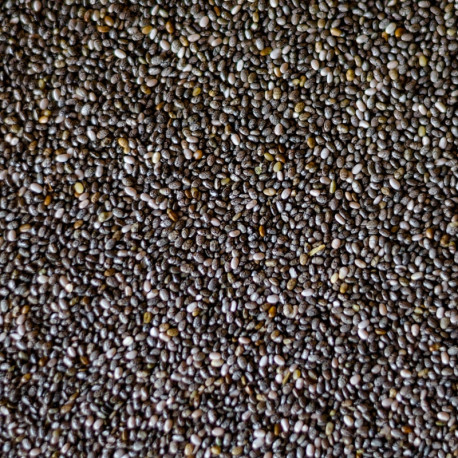- New




Reference: CHIA-VRAC-KG
Chia is a sage. It is an annual plant that can grow up to 1 m tall and whose scientific name is Salvia hispanica.
The composition of chia seeds is closely related to that of other mucilaginous seeds such as flaxseed and psyllium. Unlike flaxseed, however, chia does not present anti-nutritional factors, factors that limit the use of flaxseed without prior heat treatment. Anti-nutritional factors are cyanogenic glucosides or linatins, inhibitors of vitamin B6 that prevent its action. Chia also has a much more pleasant taste than flaxseed and is more likely to be eaten by birds.
Chia is a sage. It is an annual plant that can grow up to 1 m tall and whose scientific name is Salvia hispanica.
The composition of chia seeds is closely related to that of other mucilaginous seeds such as flaxseed and psyllium. Unlike flaxseed, however, chia does not present anti-nutritional factors, factors that limit the use of flaxseed without prior heat treatment. Anti-nutritional factors are cyanogenic glucosides or linatins, inhibitors of vitamin B6 that prevent its action. Chia also has a much more pleasant taste than flaxseed and is more likely to be eaten by birds.
Chia sage seeds are rich in flavonols (myricetol, querketol, kaempferol), flavonol glycosides, chlorogenic acids and caffeic acid.
{16}
Highlights: Chia seeds provide a good source of calcium and phosphorus and a very good source of dietary fiber and manganese.
Chia has good antioxidant activity provided by its polyphenols (chlorogenic acids, caffeic acids and flavonols).
Radish seeds have antioxidant, detoxifying, draining, and decongestant properties.
Peeled sunflower seeds are suitable for your budgies and parrots but also for straight beaks that live in outdoor aviaries in winter.
Sunflower seed contains almost 40% fat, but also proteins, carbohydrates, vitamins B and E. We quantify on a sunflower seed nearly 600 Kcalories per 100 g.
It satisfies throughout the year, the needs of a wide variety of birds, including the smallest of them.
Sunflower seeds are a real treat for our birds who love them!
No waste, no waste! The garden stays clean!
Clover stimulates the immune system and slows down cellular ageing through its excellent antioxidant properties. Rich in vitamins B, C, E and provitamin A.
Pine seeds are a good source of Phosphorus, Magnesium, Zinc, Manganese, Copper, Iron, Vitamin E, K, B1, B2, B3, B9.
Seed rich in protein, mainly present in pigeon mixes, appreciated by pigeons.
Millet is used in the diet of all birds: straight beaks and hooked beaks. In bunches, it's a treat they love.
Cluster millet has a good protein and carbohydrate content and also contains a large number of amino acids. Ideal for distracting your birds and thus avoiding pecking (feather pulling).
Extra wheat, very good quality, for all types of birds and ornamental animals, pigeons, chickens, parrots, parakeets, doves...
These seeds rich in lipids and proteins are especially appreciated by wild birds. They will attract sizerins, reeds, goldfinches, black-headed chickadees, sparrows, sad doves and a host of other birds to your garden. It is often used as a replacement for the more expensive shuttle.
The Cardy seed is rich in protein and linoleic acid, which helps reduce cholesterol levels and therefore decreases the risk of heart disease. It is found in mixes for budgerigars and parrots, but also for native birds such as bullfinches.
Cardy seeds are high in fat. The amino acid proportions of the seed are very favourable, with a very high arginine content. The seed is low in lysine and methionine + cystine, while tryptophan is completely lacking.
High-quality raw material for pigeons and chickens.
Superior quality.
Deep cleaned repeatedly.
Dust-free.
Niger, birdseed rich in phosphorus and calcium. Niger seeds (or nyjer seeds) are fine seeds rich in oil. They come from Guizotia abyssinica (also known as Guizotia oleiferous). The niger is highly prized by most birds, goldfinches and siskins love it.
The seed is mainly grown in India, Burma, Ethiopia and Nepal. Niger is an oilseed with a high fat content (38-43%) and protein content (23%). It provides quality food for all species of wild and forest birds, both in dry and sprouted form.
Niger is one of the few birdseeds with a good ratio of calcium to phosphorus.
High-quality seeds with high fat content
- With a high content of vitamin E, B9, B5, B6, B1, B2, B3, and vitamin K.
- It has antioxidant properties.
- Excellent energy contribution.
- Rich in calcium, potassium, magnesium, phosphorus, proteins, zinc, thiamine, pectin (cleanses the body).
Carrot seeds are very rich in vitamins with a high proportion of vitamin A and carotene, as well as vitamin B, calcium and valuable carbohydrates.
The canary seed is a grass, an annual plant up to 1m tall, the seeds being found in the inflorescences. These seeds represent a significant fraction of the majority of bird mixtures.
• Excellent for canaries, European and exotic birds, wavy parakeets and large parakeets.
• EXTRA canary seed has undergone extra cleaning and is of exceptional quality. Unique on the market!

Chia is a sage. It is an annual plant that can grow up to 1 m tall and whose scientific name is Salvia hispanica.
The composition of chia seeds is closely related to that of other mucilaginous seeds such as flaxseed and psyllium. Unlike flaxseed, however, chia does not present anti-nutritional factors, factors that limit the use of flaxseed without prior heat treatment. Anti-nutritional factors are cyanogenic glucosides or linatins, inhibitors of vitamin B6 that prevent its action. Chia also has a much more pleasant taste than flaxseed and is more likely to be eaten by birds.
